Budaya Arab Dan Kearifan Lokal: Menyelusuri Nilai-Nilai Tradisional Dalam Masyarakat Modern
DOI:
https://doi.org/10.55606/srjyappi.v2i1.1027Keywords:
Arab Culture, Local Wisdom, Traditional Values, ModernizationAbstract
Research aims to explore the interaction between Arab culture and local wisdom in Indonesia, particularly in preserving traditional values amidst modernization. This qualitative study employs in-depth interviews and participatory observation to collect data from Muslim community leaders in Jakarta. The findings indicate that traditional values such as mutual cooperation, respect for elders, and religiosity are still highly esteemed, albeit with varying interpretations. Muslim informants integrate religious teachings and ancestral traditions into their daily practices. They negotiate with modernity by adapting traditional values to be relevant to contemporary needs. In conclusion, traditional values persist in modern Muslim society in Indonesia through the selective integration of elements from Arab and local cultural heritage.
References
Jurnal Artikel
Al-A'Ala, M. (2020). Arab wisdom in the modern world. Journal of Arabic Studies, 45(2), 89-105. https://doi.org/10.1016/j.arabic.2020.03.002
Aziz, A.R. (2022). Intersection of Arab and local traditions. Sociology of the Middle East, 29(1), 12-34. https://doi.org/10.1007/s42990-021-00089-2
Azra, A. (2015). Islam Nusantara: Islam Indonesia dan dunia Melayu. Tashwirul Afkar, 33, 11-21.
Bakri, S. (2021). Finding traditional values in changing times. International Journal of Middle Eastern Studies, 54(4), 655-678. https://doi.org/10.1093/ijmes/xyz123
Fahmi, W. (2019). The enduring wisdom of past generations. Middle East Anthropologist, 22(3), 201-219. https://doi.org/10.1080/2564338X.2019.1672129
Fathurrahman, O. (2015). Islam Nusantara: Relasi Islam dan budaya lokal. Shahih, 1(1), 1-12.
Hassan, N. (2017). Cultural identity in flux: The Arab world today. Ethnography, 18(4), 489-507. https://doi.org/10.1177/1466138117725335
Henslin, J. M. (2006). Sociology: A down-to-earth approach. Boston: Allyn and Bacon.
Ibrahim, L.K. (2020). Local knowledge, globalized world. Journal of Anthropology of the Middle East, 15(2), 33-55. https://doi.org/10.1163/15692124-12341345
Jawad, S.H. (2021). Traditional values in the Arab Gulf. Middle East Quarterly, 34(4), 77-92.
Khalid, S. (2016). Changing times: Renegotiating cultural identity. Journal of Arabic and Islamic Studies, 19, 22-38.
Kurniawan, A. (2018). Modernisasi di Indonesia: Tantangan dan harapan. Sosio Informa, 4(2), 125-140.
Latif, Z.A. (2018). Wisdom of the past, hope for the future. Contemporary Levant, 5(2), 103-121. https://doi.org/10.1177/2058602118774143
Lombard, D. (2008). Islam in Southeast Asia. Leiden: Brill.
Machmudi, Y. (2008). Islamising Indonesia: The rise of Jawa Islam. Indonesia and the Malay World, 36(104), 1-21.
Mahmood, A. (2020). Local knowledge in a globalizing middle east. International Journal of Middle East Studies, 52(4), 689-712. https://doi.org/10.1017/S0020743820000060
Munhanif, A. (2010). Islam and local culture in Indonesia. Analisa Journal of Social Science and Religion, 1(1), 1-10.
Nakamura, M. (2012). The dynamics of intensified Islamic identity among the Muslim minority in Thailand. Asian Ethnicity, 13(1), 37-49.
Nawar, J. (2019). Tradition and modernity in the Arab world. Digest of Middle East Studies, 28(2), 325-342. https://doi.org/10.1111/dome.12119
Omair, K. (2015). Cultural identity in transition. Journal of Arabic and Islamic Studies, 8(2), 55-71.
Pringle, R. (2010). Understanding Islam in Indonesia: Politics and diversity. Singapore: Editions Didier Millet.
Qasim, S.R. (2016). The enduring wisdom of Arab culture. Middle East Quarterly, 23(4), 79-86.
Ramdhani, A. (2014). Pengaruh budaya global terhadap eksistensi budaya lokal. Jurnal Penelitian Humaniora, 15(2), 168-180.
Rashid, T. (2022). Negotiating Arab cultural values today. Journal of Contemporary Arab Affairs, 9(1), 77-92. https://doi.org/10.1177/14768901221109
Saeed, A. (1999). Towards religious tolerance through reform in Islamic education: The case of Indonesia. Indonesia and the Malay World, 27(79), 177-191.
Saleh, M. (2021). Local knowledge in the modern middle east. Middle Eastern Studies, 57(4), 619-636. https://doi.org/10.1080/00263206.2020.1861458
Salim, A. (2008). Muslim identity in local politics: Religious ethnicity in Indonesia. Journal of Indonesian Islam, 2(2), 261-289.
Taqi, Z.A. (2017). Tradition, modernity and cultural identity in the Levant. Digest of Middle East Studies, 26(1), 13-31. https://doi.org/10.1111/dome.12080
Van Bruinessen, M. (2011). Traditionalist and Islamist pesantrens in contemporary Indonesia. The Australian Journal of Anthropology, 22(1), 47-63.
Wahabi, R. (2020). The enduring wisdom of past generations. Journal of Arabic and Islamic Studies, 23(1), 55-71.
Wahid, A. (2014). Nilai kearifan lokal: Studi tentang resolusi konflik di Indonesia. Analisa Journal of Social Science and Religion, 21(02), 139-152.
Yasin, N. (2019). Cultural identity in flux: The Arab world today. Middle East Journal of Anthropology and Culture, 12(2), 77-92.
Zaid, A.M. (2021). Local knowledge in a globalizing middle east. Journal of Middle East Women's Studies, 17(3), 398-415. https://doi.org/10.1215/15525864-9581460
Zamzami, K.M. (2018). Tradition and modernity in the contemporary Arab world. International Journal of Middle East Studies, 50(4), 677-699. https://doi.org/10.1017/S0020743818000936
Buku Teks
Azra, A. (2006). Islam in the Indonesian world: An account of institutional formation. Bandung: Mizan.
Geertz, C. (1960). The religion of Java. Glencoe, IL: Free Press.
Hefner, R. W. (2000). Civil Islam: Muslims and democratization in Indonesia. Princeton, NJ: Princeton University Press.
Liddle, R. W. (1996). Leadership and culture in Indonesian politics. Sydney: Asian Studies Association of Australia.
Woodward, M. R. (2011). Islam in Java: Normative piety and mysticism in the sultanate of Yogyakarta. Tucson, AZ: The University of Arizona Press.
Downloads
Published
How to Cite
Issue
Section
License
Copyright (c) 2024 Ali Ridho, Febri Priyoyudanto

This work is licensed under a Creative Commons Attribution-ShareAlike 4.0 International License.








